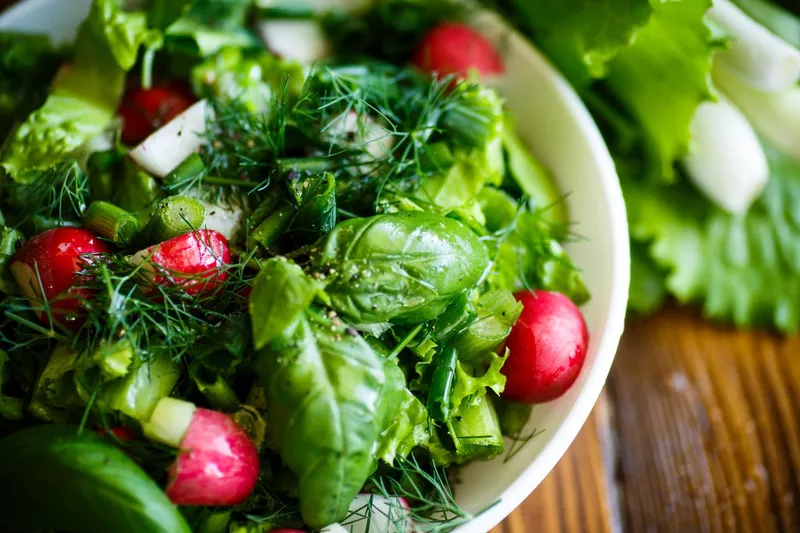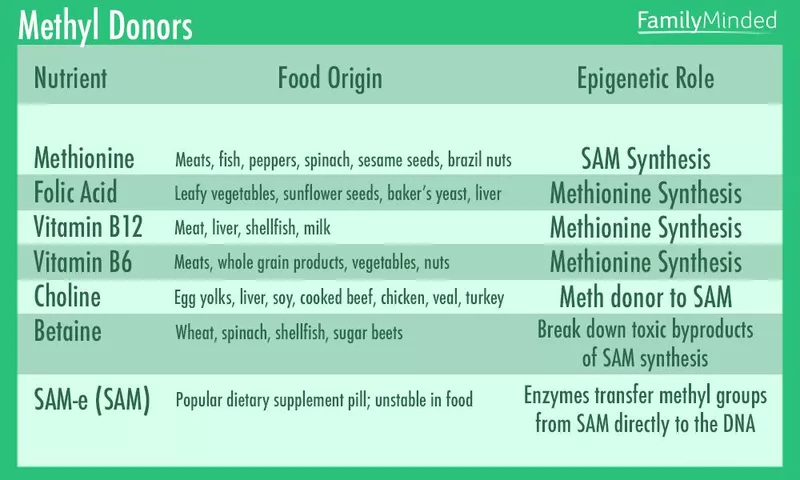Enjoying a hearty feast with friends and family is part of the fun over the holidays. Thanksgiving, Christmas, and New Year’s meals aren’t the time to be ultra-restrictive about your diet, but simply adding a second helping of roasted Brussels sprouts to your plate instead of another candied yam can alter how you feel the next day and beyond.
The food we eat can bring about changes to our epigenome (the chemical tags attached to our genes), making us more or less likely to develop certain diseases. Some foods contain methyl donors, containing nutrients that are involved in methylation, which typically function less efficiently as we age. While scientists are still researching how methylation works, eating foods that are good methyl donors can help reduce your risk of heart disease, Alzheimer’s and other age-related diseases. Other foods contain epi-bioactive nutrients, which regulate the modeling of histone proteins within our DNA, potentially lowering one’s risk of cancer.
Naturally, some popular holiday entrees and sides have more benefits than others. These holiday foods can help you feel your best in the new year. Or partially counteract some of that pie and ice cream, at least.
Dr. Lucia Aronica is a lecturer at the Stanford Prevention and Research Center within the Stanford University School of Medicine and is an expert on how diet, genetics and epigenetics interact to impact our health and longevity.
Turkey

kajakiki / Getty Images
Turkey is a staple of most holiday meals, and there are plenty of reasons to love it. It’s rich in several nutrients with epigenetic benefits, including the following:
- Methionine, a methyl donor that helps the breakdown of fats so they don’t build up in the arteries, and facilitates the removal of heavy metals from the body
- Choline, a methyl donor that improves memory, muscle control and mood
- Vitamin B, a methyl donor that helps support metabolism and the creation of new cells
- Tryptophan, which improves sleep quality and mood
People often think turkey is the reason everyone falls asleep after Thanksgiving dinner, but the real reason is that we’ve eaten enough to look like Garfield after he’s had his way with an entire lasagna.
Another tip from Dr. Lucia: “If you skip the gravy, which is rich in starches and refined carbohydrates, you can avoid spiking your glucose and insulin, gaining additional metabolic benefits.”
Obviously, it’s better for you if you don’t fry the turkey. Here’s a healthy holiday turkey recipe.
Leafy Greens

peredniankina / Getty Images
Salads are often the side dish with the most leftovers at the end of the day, but try breaking the mold and adding at least one heaping scoop of leafy greens to your plate.
Leafy veggies are high in folate, a methyl donor that helps reduce homocysteine, which can damage our blood vessels and increase the risks of plaques. It also promotes heart health and reduces the likelihood of several birth defects, which is why folate or its synthetic form folic acid is one of the key ingredients in prenatal vitamins.
Salads don’t have to be boring. This farro and kale salad includes heart-healthy grains, dried cherries and fresh goat cheese, and preparing it only takes a few minutes.
Foods That Are Good Methyl Donors

Alexa Vincent / FamilyMinded
The details of how certain foods influence our health on a metabolic and genetic level is complex, but knowing the basics of how our food affects us can make it easier to make healthier choices.
Each microscopic element found in our food performs unique actions on a cellular level.
SAM, for example, stands for S-Adenosyl-Methionine. It’s used by the body’s metabolic pathways to keep cells functioning properly. Methionine is an amino acid needed for a multitude of cellular and biosynthetic functions.
Synthesis is the process by which these important biological components are created. Put simply, foods that contain these ingredients help our bodies to function as they should, providing a protective effect against the influence of environmental factors and aging.
Chocolate

fcafotodigital / Getty Images
If you’re fully committed to keeping your holiday feast a healthy one, skip the cookies, cakes and pie and opt for some rich, silky smooth dark chocolate instead. Extra dark chocolate (85 percent or higher) has polyphenols, flavanols and catechins, epi-bioactives that help slow down epigenetic aging. In fact, cocoa and dark chocolate has more polyphenols than any other fruit, including blueberries and acai berries.
If you’re going to try out ultra-dark chocolate, spring for the good stuff. Cheaper brands are more likely to be bitter or grainy, rather than smooth and full.
Dr. Lucia Aronica is a lecturer at the Stanford Prevention and Research Center within the Stanford University School of Medicine and specializes in educating others on how to understand their unique genetic makeup to live their best lifestyle.FamilyMinded is partnering with Dr. Lucia Aronica for health and wellness news. To learn more about how you can take control of your health using science, check out Dr. Lucia’s free webinar, her website and YouTube channel.
For more tips on living well all year round, keep reading our previous collaborations with Dr. Lucia Aronica on FamilyMinded: